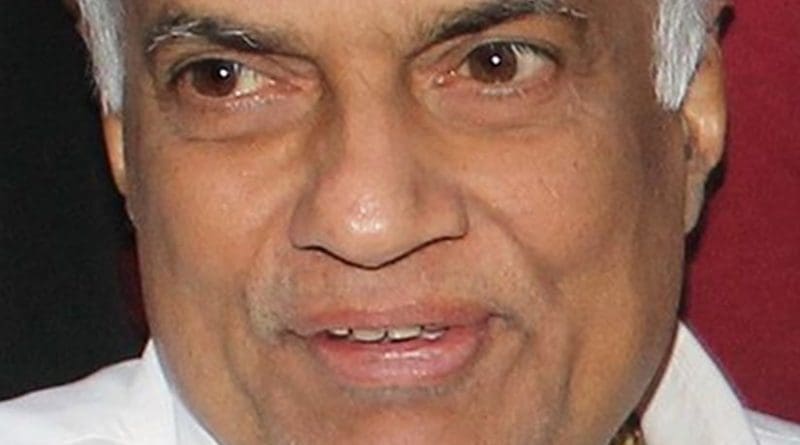Sri Lanka: Key To Indian Strategy In South Asia – Analysis
By Aniket Bhavthankar
Sri Lanka’s new Prime Minister Ranil Wickremesinghe came to India for his maiden overseas tour after his election from September 14-17, 2015. Since the appointment of Maithripala Sirisena as president of the island nation, we have witnessed several positive developments regarding India-Sri Lanka relations. Sirisena also chose India as his first overseas destination and visited New Delhi in February 2015. Indian Prime Minister Narendra Modi also paid a visit to Sri Lanka in March this year. A series of meetings between high-level dignitaries within less than a year augurs well for the bilateral relationship. These visits have brought new vigour and dynamism in ties between India and Sri Lanka. Discussions on several issues like trade, Tamil reconciliation, connectivity and maritime security were the highlights of Wickremesinghe’s visit.
Reconciliation of Tamils from the North and East provinces of Sri Lanka is one of the major issues between India and Sri Lanka. Presently, Wikremesinghe heads the national unity government and the Tamil National Alliance (TNA) is a principle opposition party in the parliament of Sri Lanka. This offers genuine opportunity for the people of Sri Lanka to resolve the Tamil issue with much more credibility. The new Sri Lankan government told the UN Human Rights Council (UNHRC) that they are committed to form the constituent assembly of parliament that will adopt a new constitution, besides a truth and reconciliation commission based on the model of South Africa. This is a very good initiative, and in contrast to the ultra nationalist position of the earlier Rajapaksa government. On September 16, 2015, the UNHRC presented its report and asked for international inquiry. India has not changed its earlier position and opposed an international probe in Sri Lanka. India hopes that establishment of this commission may lead to legitimate reconciliation of Tamils. It feels that the evolution of inclusive Sri Lanka is not separable from the authentic process of democratization. India did a good thing by reiterating its support for the national unity government in Colombo. It is pertinent to note that Modi’s government is not totally dependent on support of regional parties from Tamil Nadu, and hence can take a position based on the larger interest of India.
Sri Lanka is India’s major trading partner in South Asia. During this visit, India and Sri Lanka moved one step forward in strengthening trade ties. Sri Lanka sought to finalise the long-pending issue of Comprehensive Economic Partnership Agreement (CEPA) by mid 2016. During Mahinda Rajapaksa’s regime, Sri Lanka’s service industry raised apprehensions regarding CEPA. Earlier, during Modi’s visit, India raised this issue and assured them to take bold steps to address the issue of trade balance. India also sought support for its investors who are keen to participate in Sri Lanka’s energy, infrastructure and transport sectors. India visualizes Sri Lanka as its strongest economic partner in the region.
Connectivity is important for closer ties between the two nations and to push trade and investment. A $5.19 billion road project to connect India and Sri Lanka with a sea bridge and an underwater tunnel is believed to have been discussed by Sri Lankan Prime Minister Wickremesinghe with union Road and Transport Minister Nitin Gadkari. Both countries have proposed to construct 22 km stretch between Talaimannar in Sri Lanka and Dhanushkodi in India. The Asian Development Bank has shown keen interest in this project. India is investing energy in building up connectivity in its neighbourhood. Bangladesh, Bhutan, India and Nepal (BBIN) have signed the Motor Vehicle Agreement to enhance seamless connectivity. India also wants Sri Lanka to join the BBIN Motor Vehicle pact. India is likely to enter into a trans-Asia motor vehicle agreement with Thailand and Myanmar by the year-end. This project will be linked with BBIN.
Gadakari also expressed India’s wish to extend the trans-Asia network up to Colombo. India apparently is working on a design to consolidate connectivity in the rest of South Asia and put pressure on Pakistan.
The maritime domain has acquired a larger space in the Modi government’s foreign and defence policy. India is very sensitive about its maritime neighbourhood and the Chinese presence in this region has set alarm bells ringing in South Block. Sri Lanka is an important constituent of India’s maritime policy. During the earlier regime, Chinese presence near the Sri Lankan maritime border caused concern in India. India understands that it is difficult to match the dollar diplomacy of China and Sri Lanka will not totally bypass Beijing. But India feels that Sirisena knows Indian sensitivities and things are moving in the right direction. Wickremesinghe and Modi also agreed to boost cooperation in combating terrorism and work together for security and stability in the maritime neighbourhood.
The joint statement also takes note of Indian security concerns in the Indian Ocean region. Suspension of China-supported Colombo Port City project for environmental reasons indicates one of the positive developments for New Delhi.
India is eager to channelize process of regionalism in South Asia. Trade and connectivity are important components of this process. Wickremesinghe had extensive talks with the Indian leadership on the subject and Sri Lanka may join the BBIN. India is hopeful that Wickremesinghe’s visit would give a fillip to regionalism and provide a positive direction to maritime cooperation. It is important to note that last month
Seychelles President James Alix Michel expressed his country’s willingness to join the India-led trilateral maritime security framework that also includes Sri Lanka and Maldives. India needs a stable neighbourhood where its pre-eminence is unchallenged, if it aspires to a seat at the global high table and play a role as ‘leading power’. Sri Lanka is key to Indian strategy as it is part of South Asia and also has a maritime dimension.
*Aniket Bhavthankar is a Research Associate at the Society for Policy Studies. He can be reached at [email protected]

